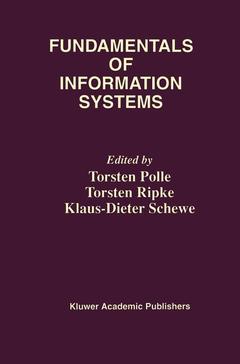Description
Fundamentals of Information Systems, 1999
The Springer International Series in Engineering and Computer Science Series, Vol. 496
Coordinators: Polle Torsten, Ripke Torsten, Schewe Klaus-Dieter
Language: English
Subjects for Fundamentals of Information Systems:
Publication date: 10-2012
185 p. · 15.5x23.5 cm · Paperback
185 p. · 15.5x23.5 cm · Paperback
Description
/li>Contents
/li>
Fundamentals of Information Systems contains articles from the 7th International Workshop on Foundations of Models and Languages for Data and Objects (FoMLaDO '98), which was held in Timmel, Germany. These articles capture various aspects of database and information systems theory:
Fundamentals of Information Systems serves as an excellent reference, providing insight into some of the most challenging research issues in the field.
- identification as a primitive of database models
- deontic action programs
- marked nulls in queries
- topological canonization in spatial databases
- complexity of search queries
- complexity of Web queries
- attribute grammars for structured document queries
- hybrid multi-level concurrency control
- efficient navigation in persistent object stores
- formal semantics of UML
- reengineering of object bases and integrity dependence
Fundamentals of Information Systems serves as an excellent reference, providing insight into some of the most challenging research issues in the field.
1 Foundations of object-oriented modeling notations in a dynamic logic framework.- 2 Identification as a Primitive of Database Models.- 3 Deontic Action Programs.- 4 Topological canonization of planar spatial data and its incremental maintenance.- 5 A Complexity Model for Web Queries.- 6 On the Use of Marked Nulls for the Evaluation of Queries Against Incomplete Relational Databases.- 7 The Matrix-Index Coding Approach to Efficient Navigation in Persistent Object Stores.- 8 On the Complexity of Search Queries.- 9 Structured document query languages based on attribute grammars: locality and non-determinism.- 10 Foundations for Integrity Independence in Relational Databases.- 11 A Hybrid Protocol for Multi-Level Transactions.- 12 Restructuring Object-Oriented Database Schemata by Concept Analysis.
© 2024 LAVOISIER S.A.S.




